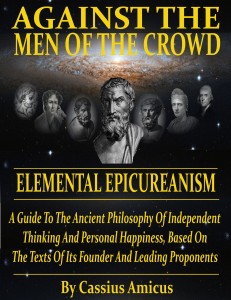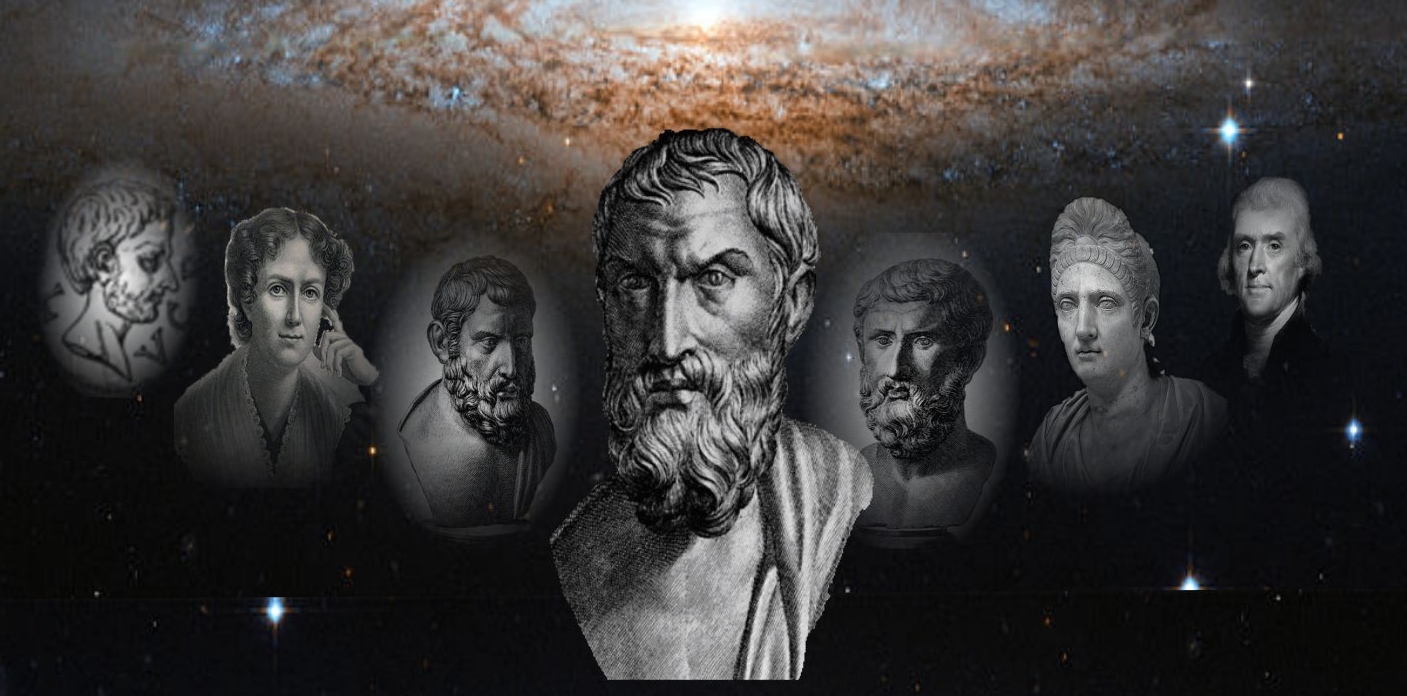New Ebook: “Against The Men of the Crowd”
Today I am launching a new Ebook, entitled “Against the Men of the Crowd.” Find this and my other ebooks on the Smashwords page here. (Amazon link hopefully to be added soon). As always, I am torn between getting a work finished and published vs. making sure all errors are swatted. I know a few typos remain, and I will appreciate anyone who catches any bringing them to my attention to be sure they are corrected. Of course comments on substance are welcomed as well.
The ebook, and especially the title essay, are the result of my reading and thinking over the last several months, along with discussions I have had with a number of good friends on the Epicurus Facebook page. I won’t call them by name here, for they know who they are, but I particularly want to point out how helpful it has been to receive suggestions from friends who have found texts on the internet that I was not aware of previously. Starting with “A Few Days In Athens,” which provides excellent arguments and intriguing further connections with Thomas Jefferson, the latest suggestion of great assistance was the text of Philodemus’ “On Methods of Inference.”
especially the title essay, are the result of my reading and thinking over the last several months, along with discussions I have had with a number of good friends on the Epicurus Facebook page. I won’t call them by name here, for they know who they are, but I particularly want to point out how helpful it has been to receive suggestions from friends who have found texts on the internet that I was not aware of previously. Starting with “A Few Days In Athens,” which provides excellent arguments and intriguing further connections with Thomas Jefferson, the latest suggestion of great assistance was the text of Philodemus’ “On Methods of Inference.”
One of the issues in Epicureanism I find most interesting is the role of “reason” in the Canon of Truth. Readers here know that I follow the opinions on Norman DeWitt on this subject, especially as he expressed them in his “Epicurus and His Philosophy.” Now that I have been exposed to Philodemus’ arguments in the fragments available from Herculaneum, I find the subject even more compelling and important.
Links: MP3 Download Links: Full Essay (70 minutes) Abridged version (30 minutes)Above is an audio version of the full “Against the Men of the Crowd” essay. An “abridged” version, which is thirty minutes shorter and omits the details of Philodemus’ responses to the attacks on Epicurean thinking, can be found here:
I have written “Against the Men of the Crowd” with that latest thinking in mind. As I state in the introduction, I do not represent that any of the text in this essay is a direct translation of the ancient records. I do not represent that any of the ideas in this essay were arranged in the ancient texts in the same way they are arranged here. What I do represent is that each of the arguments and ideas presented here existed in substantially the same form in the works of Epicurus and his followers two thousand years ago. My goal in preparing this new essay has been to cut through the layers of misrepresentation, misunderstanding, and academic commentary and to present the ideas of Epicurus to the average man or woman of today in way that is at one and the same time relevant, understandable, and fully consistent with the vision of the ancient Epicureans.
Here is the full introduction:
In 1822, a young woman from Scotland by the name of Frances Wright published a book entitled “A Few Days In Athens.” By the time of its publication, Wright had become a friend of the Marquis de Lafayette, and she ultimately traveled in his company to America to visit Thomas Jefferson at Monticello. Jefferson described Wright’s book as a “treat to me of the highest order,” and made many notes of its content in his personal journals. What Wright had presented to Jefferson, and to the world, was a vigorous and enthusiastic defense of the philosophy of Epicurus.
Wright closed her book with Epicurus delivering these words:
“We have considered the unsound fabric of religion. It remains to consider that, equally unsound, of morals. The virtue of man is false as his faith. What folly invented, knavery supports. Let us arise in our strength, examine, judge, and be free!” The teacher here paused. The crowd stood, as if yet listening. “At a convenient season, my children, we will examine farther into the nature of man, and the science of life.”
A convenient season has arrived.
This book has been prepared to assist in opening to a new generation of readers the philosophy of Epicurus, the man renowned in the ancient world as the Master-Builder of Human Happiness.
Against the Men of the Crowd, the title essay in this collection, presents a summary of the full frontal attack which Epicurus launched on the religions and the virtues of the leaders of the Men of the Crowd. I do not represent that any of the text in this essay is a direct translation of the ancient records. I do not represent that any of the ideas in this essay were arranged in the ancient texts in the same way they are arranged here. What I do represent is that each of the arguments and ideas presented here existed in substantially the same form in the works of Epicurus and his followers two thousand years ago. My goal in preparing this new essay has been to cut through the layers of misrepresentation, misunderstanding, and academic commentary and to present the ideas of Epicurus to the average man or woman of today in way that is at one and the same time relevant, understandable, and fully consistent with the vision of the ancient Epicureans.
The reader who is familiar with Epicurean literature will readily recognize the sources of the arguments that have been combined to make up Against the Men of the Crowd. Beginning with the theme presented in the opening of Book VI of Lucretius’ “On the Nature of Things,” the essay then turns to the issue of how we know what it is we claim to know, as developed in other sections of Lucretius’ poem. Many of the details that follow are taken from the work known as “On Methods of Inference,” left to us by Philodemus of Gadara, and preserved for the modern world only due to the burial of Herculaneum in the eruption of Pompeii in 79 AD. After those details are presented, the urgency of the issues involved are emphasized with arguments taken from one of the many Epicurean letters of Seneca. The essay concludes with the summation delivered by Torquatus in his extensive “Defense of Epicurus” from Cicero’s “On Ends.”
The next five chapters which follow are my “Elemental Editions” of the several of the most authoritative Epicurean texts, included here for the first time in book form. These are: (2) Epicurus’ Letter to Herodotus on general principles of Nature, (3) Epicurus’ letter to Pythocles on Astronomy, (4) Epicurus’ Letter to Menoeceus on Ethics, (5) The Inscription of Diogenes of Oinoanda, and (6) the “Defense of Epicurus” delivered by Torquatus as recorded by Cicero. Like the opening essay, the texts of these “Elemental Editions” are not literal translations, but modernized paraphrases tuned to the ear and the style of a modern audience.
With no apology let me emphasize that this book is not written for academic researchers, or for those whose interest in Epicurus is primarily historical. This book is written for those who wish to understand for themselves, so they can apply for themselves in their own lives, the wisdom of Epicurus.
In the words which Frances Wright gave to Epicurus in 1822, Let us arise in our strength, examine, judge, and be free!
Peace and Safety!
Cassius Amicus, October, 2013
I will update this post with links to where the epub will be available on Amazon, and for direct download. Please do not purchase this at Amazon (for 99 cents) unless you really want a copy on your Kindle. I am not aware of a way to publish this there for free, so I have selected the lowest price possible. I will also post a link for mp3 download.

